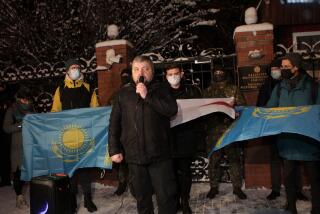PERSPECTIVE ON THE SOVIET UNION : Can Heroes Make a Difference? : Individual greatness toppled the sclerotic Soviet system. Can jaded America respond to new dreams and leadership?
- Share via
It was in June, 1988, that Mikhail S. Gorbachev summoned a historic conference of the Soviet Communist Party. The gathering voted to allow within months the first free elections in the Soviet Union, and unleashed a revolution from the Siberian coal mines to the Berlin Wall.
Just 39 months separate that fateful meeting in Moscow from George Bush’s dramatic speech last Friday night on redeployment and reduction of America’s nuclear arsenal. Just 39 months have begun to shatter the rigidly enshrined, massively financed dogmas of more than 40 years. Just 39 months have fundamentally transformed our world.
Of course, as the critics were quick to note, the President’s address was something of the old arms-control shell game, moving weapons to and fro, generously disposing of anachronisms. As Tallulah Bankhead once said of a popular play, “There is less in this than meets the eye.”
Still, the larger reality and momentum of change are undeniable, the meaning and possibilities too important to be lost in a posture of sophistication. As the President sat in the Oval Office, putting away some of the nuclear brass knuckles we so habitually carried, it was surely a moment to reflect on why and how all this was happening--how much the impossible was within us, how yielding was the immutable.
The giddy change of these 39 months may baffle historians in some respects, but at least one lesson of history seems reconfirmed. The old Soviet system was at once sclerotic and seething with change; there were vast forces at work. Yet it was sheer leadership, the intervention of individual greatness, that made the decisive difference.
Imagine Bush’s speech without Gorbachev’s perestroika confronting the Soviet system honestly with its root failure, without glasnost to put television cameras in the dark Soviet streets to record the actions of the army and secret police, without raucous free speech in the new Soviet Congress, without Gorbachev himself telling the crusty old German Communist leader, Erich Honecker, that military suppression of East European democracy was now unthinkable. Imagine Bush capping missiles without the existence of Gorbachev, Eduard Shevardnadze, Andrei Sakharov, Boris Yeltsin and others. Imagine these 39 months without leaders, without heroes.
It seems ironic that such figures emerged out of a political culture that long ago was supposed to have extinguished individuality, killed courage and candor along with all its other victims. How ironic as well that it was these old Marxists who showed us so much about resistence to fatalism and determinism, about initiative and will.
The Soviets were not considered singular in their lack of inspiration. Some years ago, the distinguished British journalist Henry Fairlie ruefully pronounced America “too rich for heroes,” a nation grown spent and slack, oblivious to its history and native idealism, its politics enslaved by special interests.
“Heroes act against things-as-they-are,” Fairlie wrote in 1978. “They break through the pattern . . . the ruck that most of us accept out of indifference or weariness. They say that things aren’t necessarily so, that they can be altered if we strain to change them.” But the Americans, he went on, had not had such leadership for a long while.
Fairlie was writing, to be sure, before these unthinkable 39 months, and before, too, the ruinous orgy of the 1980s in American society. The possibility of heroism is suddenly far more real--and the need far more grave.
Much as in the Soviet Union before glasnost, everyone knows what is wrong--how much money controls and tyrannizes our political system, how unfairly and undemocratically we have distributed wealth and influence in our democracy, how distorted our public priorities have become.
Is the status quo so intractable? Is George Bush more a creature of his system, more the party bureaucrat, than Mikhail Gorbachev? If the President of the United States joined House Speaker Tom Foley and Senate leader George Mitchell in truly changing our course, would they be less decisive than Andrei Sakharov and Boris Yeltsin? Are America’s problems somehow beyond leadership, beyond sacrifice? Are we too jaded to respond to heroic leadership even if it should come?
Americans have evolved a government, Barbara Tuchman wrote just before she died, “of shoddy and peccant men, inept and corrupt, yet always laced with workers and dreamers of a change for the better.” In the end, that was the promise of the President’s speech, and of the history that made it possible. The time for the “workers and dreamers” has come at last.
More to Read
Sign up for Essential California
The most important California stories and recommendations in your inbox every morning.
You may occasionally receive promotional content from the Los Angeles Times.













